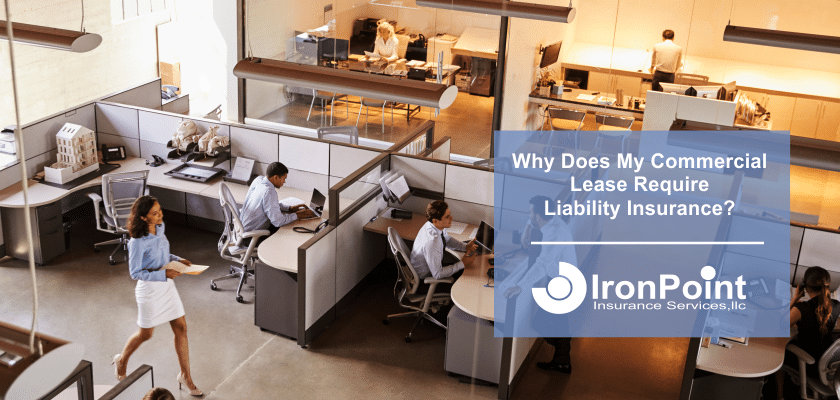Commercial Lease Insurance Requirements: What Business Owners Should Know Before Signing

You found the perfect location. The commercial lease terms seemed reasonable. You were ready to sign on the dotted line and get your business rolling.
Then you saw it—that insurance requirement. Not just any insurance, but general liability insurance with coverage limits that made your eyes widen.
Is your landlord trying to squeeze more money out of you? Or is there something crucial you’re missing about this seemingly mundane requirement?
Here’s the truth: That liability insurance clause isn’t just legal mumbo-jumbo. It’s the thin line between business success and financial ruin.
Let’s break down what your landlord knows that you might not—and why this “boring” insurance requirement might be the most important part of your lease.
What’s Really at Stake? Understanding Liability Insurance
Picture this: A customer walks into your new space, slips on a wet floor, and breaks their wrist. They can’t work for three months. Medical bills pile up. They hire an attorney.
Who pays?
Without proper insurance, the answer is simple: You do. Every. Last. Penny.
Liability insurance isn’t just another bill—it’s your financial forcefield against the unpredictable chaos of running a business in the real world.
The Three-Headed Monster Liability Insurance Slays
When disaster strikes, liability insurance tackles three potential business-killers:
- Bodily Injury: When someone gets hurt on your watch, your insurance steps in before your bank account gets emptied.
- Property Damage: Accidentally damage someone else’s stuff? Your insurance has your back.
- Legal Costs: Even if you did nothing wrong, defending yourself isn’t cheap. Liability insurance covers those eye-watering attorney fees and potential settlements.
The Insurance Arsenal: What You’ll Actually Need
Your lease likely mentions several types of insurance. Here’s what they actually mean for your business:
- General Liability Insurance: This is your frontline defense against third-party claims. It’s the non-negotiable your landlord is (rightfully) insisting on.
- Commercial Property Insurance: This protects your stuff—inventory, equipment, furnishings—from theft, fire, and other disasters.
- Umbrella Insurance: Think of this as your backup parachute—extra protection that kicks in when your primary policy hits its limits.
The Commercial Lease: Reading Between the Lines
That stack of papers you’re about to sign? It’s not just about monthly rent and maintenance responsibilities. It’s a risk allocation agreement.
Your landlord isn’t trying to make your life difficult with insurance requirements. They’re protecting their investment—and inadvertently, protecting you too.
What Your Lease Actually Demands
Buried in your lease’s insurance section, you’ll likely find these critical elements:
- Coverage Minimums: Most landlords require $1-2 million in liability coverage. This isn’t arbitrary—it’s based on real-world claim data.
- Proof Requirements: You’ll need to show a Certificate of Insurance before move-in and at each renewal.
- Additional Insured Status: Your landlord wants their name on your policy. This isn’t greed—it’s smart business practice that protects both parties.
Why Your Landlord Isn’t Just Being Difficult
Your landlord isn’t staying up at night worrying about insurance for fun. They’ve seen what happens when tenants skimp on coverage.
What’s in it for the Landlord
From your landlord’s perspective, your insurance policy means:
- They won’t foot the bill for your customer’s broken ankle
- Their insurance premiums won’t skyrocket because of your mishap
- They can sleep at night knowing their investment is protected
What’s Really in It for You
Here’s where things get interesting. That “burdensome” insurance requirement is actually your secret weapon:
- Lawsuit Shield: A single liability claim can exceed $100,000. Without insurance, could your business absorb that hit?
- Lease Protection: No insurance = lease violation = potential eviction. Not exactly the business disruption you were planning for.
- Business Continuity: When the unexpected happens (and it will), insurance means you can focus on recovery instead of bankruptcy proceedings.
The Legal Reality Check
In many places, operating without proper insurance isn’t just risky—it’s illegal. Your landlord knows this, and they’re not interested in having a tenant who’s one inspection away from being shut down.
Commercial Property: Where Risk Lurks Around Every Corner
Commercial spaces are risk magnets. Period.
The Slip and Fall Time Bomb
It happens more than you think. Someone visits your business, falls, and suddenly you’re facing a six-figure claim. The average slip and fall settlement? $50,000-$100,000. Without insurance, that’s coming directly from your business account.
When Your Business Becomes a Domino
Think your actions only affect your space? Think again. That small electrical fire that started in your unit can quickly become the reason the entire building needs renovation. Without proper coverage, you could be liable for the whole building’s damages.
Your Business, Your Unique Risks
Every business faces different hazards. A restaurant deals with hot surfaces and food safety. A retail store manages display hazards and high foot traffic. An office might seem safer, but ergonomic injuries and data breaches present their own risks.
The Fine Print That Could Save (or Sink) Your Business
Not all commercial lease language is created equal. Here’s what to watch for:
The Insurance Requirements: Devil in the Details
Read this section line by line. Understand:
- Exactly which insurance types you need
- The minimum coverage amounts required
- Who needs to be listed on your policy
Indemnification: The Legal Loophole
Indemnification clauses are legal language that shift liability. In plain English, these clauses might make you responsible for incidents even when they’re not entirely your fault. Make sure your insurance covers these obligations—or negotiate this language before signing.
Waiver of Subrogation: Insurance Company Handcuffs
This clause prevents your insurance company from going after your landlord to recoup claim payments. Most landlords demand it. Make sure your policy includes it, or you could find yourself in breach of contract.
The Real Cost of Cutting Corners on Insurance
Skipping proper insurance is like driving without brakes—it works fine until it doesn’t. Then it’s catastrophic.
The Financial Fallout
Without insurance, you’re one accident away from financial disaster. Even minor incidents can trigger five-figure expenses. Major ones? They can erase years of profit in an instant.
Lease Violation: The Eviction Trap
Violate your insurance requirements, and you’ve handed your landlord grounds for eviction. Imagine building customer relationships, establishing your location, and then being forced to relocate—all because you tried to save a few dollars on insurance.
When the Legal System Comes Knocking
Without insurance, a lawsuit doesn’t just threaten your business assets—it can come after your personal ones too. Limited liability protection has its limits, especially when negligence is involved.
Finding Your Perfect Insurance Match
Insurance isn’t one-size-fits-all. Your business deserves coverage as unique as it is.
Beyond the Minimum: Right-Sizing Your Coverage
Smart insurance planning means understanding your specific risks. A high-end jewelry store needs different coverage than a consulting firm. Your coverage should reflect your reality, not just your lease minimum.
Your Secret Weapon: An Insurance Agent Who Gets It
Finding an agent who understands commercial leases is like finding a great attorney—invaluable. They can translate lease requirements into the right policies, often finding ways to save you money while maximizing protection.
Making Your Policy Lease-Compliant
Before signing anything, have your agent review your lease requirements. They can ensure your policy checks all the boxes, from additional insureds to coverage limits to special endorsements.
Beyond the Basics: Insurance Your Lease Doesn’t Require (But You Might Need)
Your lease covers the landlord’s concerns. But what about yours?
- Business Interruption Insurance: If disaster strikes and you can’t operate, this coverage keeps money flowing while you rebuild.
- Workers’ Compensation Insurance: If you have employees, this isn’t just smart—it’s mandatory in most states.
Proving You’re Protected: The Certificate Dance
Your landlord wants proof you’re insured, typically through a Certificate of Insurance (COI). This single-page document shows your coverage types, limits, and additional insureds.
Staying Current: The Renewal Rhythm
Mark your insurance renewal dates on your calendar. A lapsed policy equals a lease violation, and your landlord will likely be notified automatically if your coverage drops.
The Bottom Line: Insurance as Business Strategy
That insurance requirement in your lease? It’s not a burden—it’s business wisdom in disguise.
Proper liability coverage doesn’t just protect your landlord. It creates a foundation that allows your business to take calculated risks, grow with confidence, and survive the inevitable bumps along the way.
By understanding what’s really behind those insurance requirements, you can transform a seemingly tedious lease obligation into a strategic business advantage.
Don’t Let Insurance Requirements Hold Up Your Perfect Location
Ready to get coverage that satisfies your lease and protects your business future? Contact us today, or start the conversation with an online quote. Our team specializes in commercial lease insurance requirements, and we’ll make sure you’re covered properly from day one.
Let’s Get Started
Select the way you want to start your quote.
Let’s Get In Touch
Compare Quote Online

Compare Business Quotes
Looking for business insurance? Click “Start a Quote” to compare Business Owner’s Policy and Worker’s Compensation rates. Ready to purchase? Choose “Quote & Buy Online” to buy directly online.
Rather speak with an insurance agent?
1-877-334-7646






